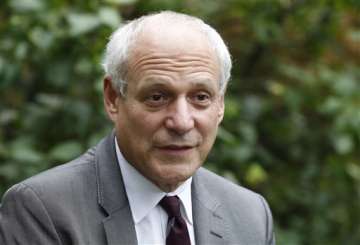Journalist with Ebola has passion for Liberia
Providence, Rhode Island: A passion for Liberia and the plight of its people drove Ashoka Mukpo to work there, first to aid relief efforts and then as a photojournalist to tell its story. But Mukpo
Providence, Rhode Island: A passion for Liberia and the plight of its people drove Ashoka Mukpo to work there, first to aid relief efforts and then as a photojournalist to tell its story. But Mukpo has an unusual story of his own: As an infant, he was identified as a reincarnated Tibetan lama, a role he chose not to pursue.
Mukpo, 33, was diagnosed on Thursday with Ebola and was being cared for at a treatment center in the Liberian capital, Monrovia. His family said he was expected to leave there on Sunday and arrive at the Nebraska Medical Center in Omaha on Monday.
His mother, Diana Mukpo, comes from an upper-class aristocratic family in Great Britain. At age 16, she left boarding school in Scotland and married Tibetan Buddhist leader Chogyam Trungpa Rinpoche, who founded the Shambhala community that spread
Buddhism in the West. She was one of several wives.
They moved to Boulder, Colorado, in the 1970s and set up a Buddhist center, where notables such as Allen Ginsberg, Joni Mitchell and William Burroughs studied and Trungpa advocated tantric sex.
After starting a family with Trungpa, Mukpo's mother connected with another of her husband's followers, Dr. Mitchell Levy, a Jewish man from New York.
Levy is Mukpo's biological father, Mukpo said in an interview with the Dorje Shugden Buddhist website, but Trungpa raised Mukpo as his own son.
When Mukpo was a few months old, he was recognized by another Buddhist lama as the ninth Khamnyon Tulku, or reincarnated lama, a spiritual leader.
Mukpo's older half-brother, Gesar Mukpo, son of Diana Mukpo and Trungpa, also was named a tulku and succeeded his father as leader of the Shambhala community after his death in 1987.
After he died, Mukpo's mother and Levy married and moved to Providence. Levy is medical director of the intensive care unit at Rhode Island Hospital and a professor and chief of pulmonary and critical care medicine at Brown University's medical school. Mukpo's mother is a horse trainer who owns a stable outside Boston.
Mukpo attended Moses Brown, a Quaker day school in Providence. He received degrees from Georgetown University and the London School of Economics.
His more traditional life sometimes caused angst.
“When you're 15, you can't say, ‘Dude, I'm a reincarnated spiritual master from the hills of Tibet, and my father was this womanizing, drinking, Tibetan-crazy-wisdom genius,' without people thinking you're weird,” he said in the Dorje Shugden interview.
In 2002, he traveled to Tibet with his parents to visit the monastery that's his family's spiritual home.
“Someone put a sick baby in front of my face and asked me to blow on it. I did. I'm not going to be the guy who says, ‘This whole thing doesn't make sense for me, sorry!”' he said in the interview. “Sometimes I do feel like it wasn't my decision to take this title on, but now I feel like someone put me in the position of abandoning it.”
Mukpo ultimately decided not to embrace his status as a reincarnated lama, although he's still a practicing Buddhist, Levy said.
“He's proud of his street cred and his intellectual credibility that he feels he's earned, and for him, the reincarnated tulku, although a powerful tradition and a very important tradition, I don't think he wanted to feel like he was being handed something he didn't earn,” Levy said.
Mukpo has worked at Human Rights Watch and spent two years in Liberia working as a researcher for the Sustainable Development Institute, a nonprofit shining light on concerns of workers in mining camps outside Monrovia.
Levy said his son returned to Providence in May and intended to pursue a career as a journalist. By August, he saw what was happening in Liberia and decided to return, Levy said.
“His intention in going back was to illustrate the tremendous burden and impact of the Ebola epidemic,” Levy said. “He sensed that the international community was isolating Liberia rather than reaching out to help them.”
Mukpo said he was filming inside and around clinics and high-risk areas but doesn't know how he was infected, Levy said.
Levy said he's been reassuring his son, who is staying in an isolation tent and will receive better care in the U.S., that he'll recover.
Besides NBC, Mukpo has worked for Vice News and other media outlets. In an opinion piece in Al Jazeera America on Sept. 17, Mukpo wrote that in the last few weeks he had seen children close to death turned away from treatment centers and heard stories of people waiting days to be picked up by ambulances.
He called the American response to the crisis underwhelming and slow. “The most critical element of all is time,” he wrote. “Every life saved matters.”
